
- About Department
- Vision, Mission,PEO
- POs, PSOs
- Faculty
- Laboratory
- Placement
- Research
- Events Organized
- Curriculum & Syllabus
- Video Lecturing
- Activity Based Learning
- Mou
- Industry Interaction
- News & Magazine
- Value Added Courses
- Contact Us
Department of Electrical and Electronics Engineering
About Department
The Department of Electrical and Electronics Engineering, established in 2008, focuses on providing students with a robust academic foundation and real-world readiness. Offering a four-year B.E program, our faculty, with industry and academic expertise, ensures a holistic learning experience. Our facilities include state-of-the-art laboratories in Power Electronics and drives, Electrical Machines Lab, Control and instrumentation lab, Power system simulation lab, and R & D lab. We hold professional memberships with esteemed societies like IEI and PALS, IIT Madras, fostering industry-academic ties. Collaborations through MOUs with reputed industries enable activities such as guest lectures, workshops, and industrial visits, enhancing practical exposure.
Internships with renowned companies contribute to a consistent placement record above 85%. Graduates find opportunities in Power industries, Government PSUs, R&D Units, IT, Telecommunications, Manufacturing, and Startups. The department’s dedication to bridging academia and industry, coupled with diverse career paths, makes it a dynamic hub for Electrical and Electronics Engineering education. “Without Power a Man is Zero” and “With Power, a Man is a Hero” encapsulate our commitment to empowering future professionals.
Vision
To mould the young minds of Electrical and Electronics Engineering professionals with high standard of education, research and innovation to serve the society ethically.
Mission
- To provide comprehensive education for the students to excel in the field of Electrical and Electronics Engineering.
- To facilitate a supportive environment to enhance research and innovation.
- To impart industry oriented technical skills through collaborative activities.
- To inculcate professional ethics and human values among student community.
- To nurture the communication and leadership skills among students through multidisciplinary activities.
Programe Educational Objectives(PEO)
- To equip students with a strong foundation in technical knowledge and skills in Electrical and Electronics Engineering, enabling them to excel in their chosen careers.
- To develop students’ communication skills, enabling them to effectively convey technical information and collaborate with others in a professional setting.
- To foster creativity and innovation among students, encouraging them to think critically and solve complex problems in Electrical and Electronics Engineering.
- To instill students to demonstrate ethical behavior and professional responsibility in their work.
PROGRAM OUTCOMES (POs)
-
Engineering Graduates will be able to
-
PO 1 Engineering Knowledge: Apply the knowledge of mathematics, science, engineering Fundamentals, and an engineering specialization to the solution of complex engineering problems
-
PO 2 Problem Analysis: Identify, formulate, review research literature, and analyze complex engineering problems reaching substantiated conclusions using first principles of mathematics, natural sciences, and engineering sciences.
-
PO 3 Design/ Development of Solutions: Identify, formulate, review research literature, and analyze complex engineering problems reaching substantiated conclusions using first principles of mathematics, natural sciences, and engineering sciences.
-
PO 4 Conduct Investigations of Complex Problems: Use research-based knowledge and research methods including design of experiments, analysis and interpretation of data, and synthesis of the information to provide valid conclusions
-
PO 5 Modern Tool Usage: Create, select, and apply appropriate techniques, resources, and modern engineering and IT tools including prediction and modelling to complex engineering activities with an understanding of the limitations.
-
PO 6 The Engineer and Society: Apply reasoning informed by the contextual knowledge to assess societal, health, safety, legal and cultural issues and the consequent responsibilities relevant to the professional engineering practice.
-
PO 7 Environment and Sustainability: Understand the impact of the professional engineering solutions in societal and environmental contexts, and demonstrate the knowledge of, and need for sustainable development.
-
PO 8 Ethics: Apply ethical principles and commit to professional ethics and responsibilities and norms of the engineering practice.
-
PO 9 Individual and Team Work: Function effectively as an individual, and as a member or leader in diverse teams, and in multidisciplinary settings.
-
PO 10 Communication: Communicate effectively on complex engineering activities with the engineering community and with society at large, such as, being able to comprehend and write effective reports and design documentation, make effective presentations, and give and receive clear instructions.
-
PO 11 Project Management and Finance: Demonstrate knowledge and understanding of the engineering and management principles and apply these to one’s own work, as a member and leader in a team, to manage projects and in multidisciplinary environments.
-
PO 12 Life-long learning: Recognize the need for, and have the preparation and ability to engage in independent and life-long learning in the broadest context of technological change.
PROGRAM SPECIFIC OUTCOMES(PSOs)
-
To design, develop, and implement modern technologies for solid state devices and circuits, control systems, and power systems by incorporating principles from basic science, engineering science, humanities, and social science.
-
To analyze and evaluate the performance of electrical & electronic systems using simulation and modeling techniques.
| Sl. No | Name | Designation |
|---|---|---|
| 1 | Dr. S. Rajasekaran | DEAN / Professor |
| 2 | Dr. B. Muruganandham | Registrar / Professor |
| 3 | Mrs. S. Rakkammal | Asso. Prof. & HoD |
| 4 | Mrs. A. Mary Beula | Associate Professor |
| 5 | Mr. N. Mayavel | Assistant Professor |
| 6 | Mr. R. Surendar | Assistant Professor |
| 7 | Mrs. L. Gladia Amala | Assistant Professor |
| 8 | Mr. J. Nagendran | Assistant Professor |
| 9 | Mrs. S. Selvi | Assistant Professor |
| 10 | Mr. M. Vijay Anand | Assistant Professor |
Laboratory Specification
S.No | Name of the Major Equipments | |
1. | Slip ring induction motor | |
2. | Squirrel Cage Induction Motor | |
3. | Synchronous motor | |
4. | DC shunt motor | |
5. | Alternator coupled with DC Shunt motor | |
6. | DC series motor | |
7. | DC compound motor | |
8. | Three phase Transformer | |
9. | Single phase Induction motor | |
10. | Single phase Autotransformer | |
11. | Three phase Autotransformer | |
12. | Shunt motor-Generator set | |
13. | Shunt motor -series generator set | |
14. | Shunt motor -compound generator set | |
15. | Resistive load bank (3phase & 1 Phase) | |
16. | Capacitive load bank | |
17. | Inductive load bank | |
Cost: | Rs.33.68 Lakhs | |
Area: | 2613 Sq.feet | |
S.No | Name of the Major Equipments | |
1 | IGBT based PWM Single phase Inverter | |
2 | MOSFET based chopper IGBT Based chopper | |
3 | SCR & TRIAC based Single phase AC controller | |
4 | Single Phase Half Controlled Converter | |
5 | Single Phase Fully Controlled Converter | |
6 | Three phase SCR Fully controlled converter | |
7 | Three phase Half controlled converter | |
8 | Single Phase Cyclo Converter | |
9 | MOSFET based step-up & step-down chopper | |
10 | Buck converter | |
11 | Boost converter | |
12 | Buck-Boost converter | |
13 | Resonant Converter | |
14 | Characteristics of PMBLDC Motor | |
15 | CRO &DSO | |
Cost: | Rs.9.69 Lakhs | |
Area: | 720 Sq. feet | |
S. No | Name of the Major Equipments | |
1. | PID controller simulation and learner kit | |
2. | DC motor coupled with Generator | |
3. | Pressure champer with Air foot pump | |
4. | Flow Measurement Trainer kit | |
5. | Function Generator | |
6. | Position Control Systems Kit | |
7. | AC Synchro transmitter & receiver | |
8. | Optical sensor | |
9. | Strain Gauge Kit with Handy lever beam | |
10. | Design of Lag-Lead compensator | |
11. | ADC Trainer Kit | |
12. | DAC Trainer Kit | |
13. | LVDT Trainer Kit | |
14. | CRO | |
15. | DSO | |
Cost | Rs 7.38 Lakhs | |
Area | 714 Sq.feet | |
S. No | Name of the Major Equipments | |
1. | Personal computers (Intel i3, 80GB HDD, 2GB RAM) | |
2. | PV panels | |
3. | Battery storage system with charge and discharge control 40Ah | |
4. | Micro Wind Energy Generator module | |
5. | Fuel Cell Trainer | |
6. | Open Source Softwares SCI lab Xcircuit | |
Cost: | Rs 6.26 Lakhs | |
Area: | 687 Sq. feet | |
S.No | Name of the Major Equipments | |
1. | Personal computers (Intel i7,16GB RAM, 128GB SSD+1TB HDD) | |
2. | Printer | |
3. | Open Source Softwares SCI lab Xcircuit MatPower | |
Cost: | Rs 7.71 Lakhs | |
Area: | 684 Sq.feet | |
S.No | Name of the Major Equipments | |
1. | Personal Computers (Intel i7,16GB RAM, 128GB SSD+1TB HDD) | |
2. | IoT Kit | |
3. | Charging Equipment for EV | |
4. | PV Emulator | |
5. | Solar and micro wind setup | |
6. | MASTeR Green Power plant of 25 KW on Grid | |
Cost | Rs. 12.86 Lakhs | |
Area | 687 Sq. feet | |
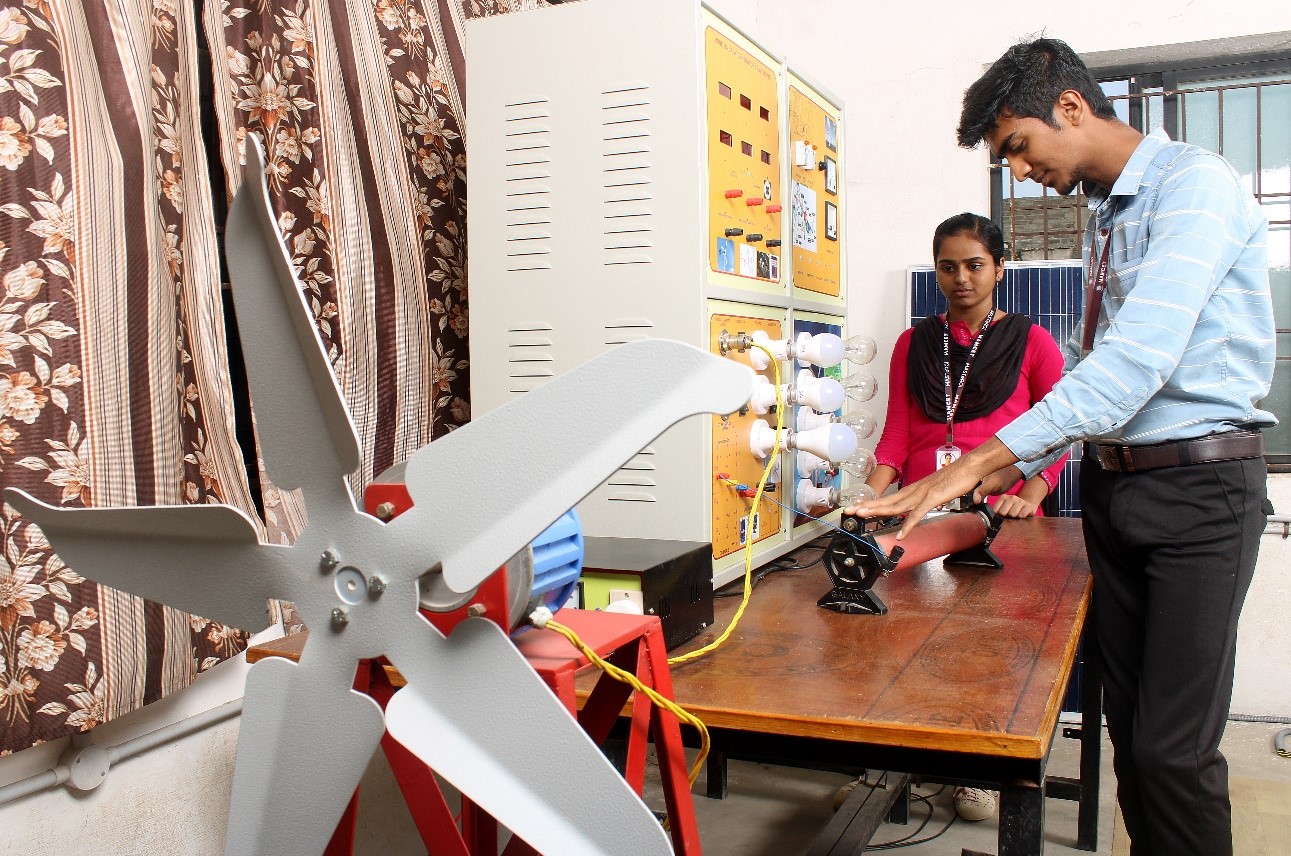
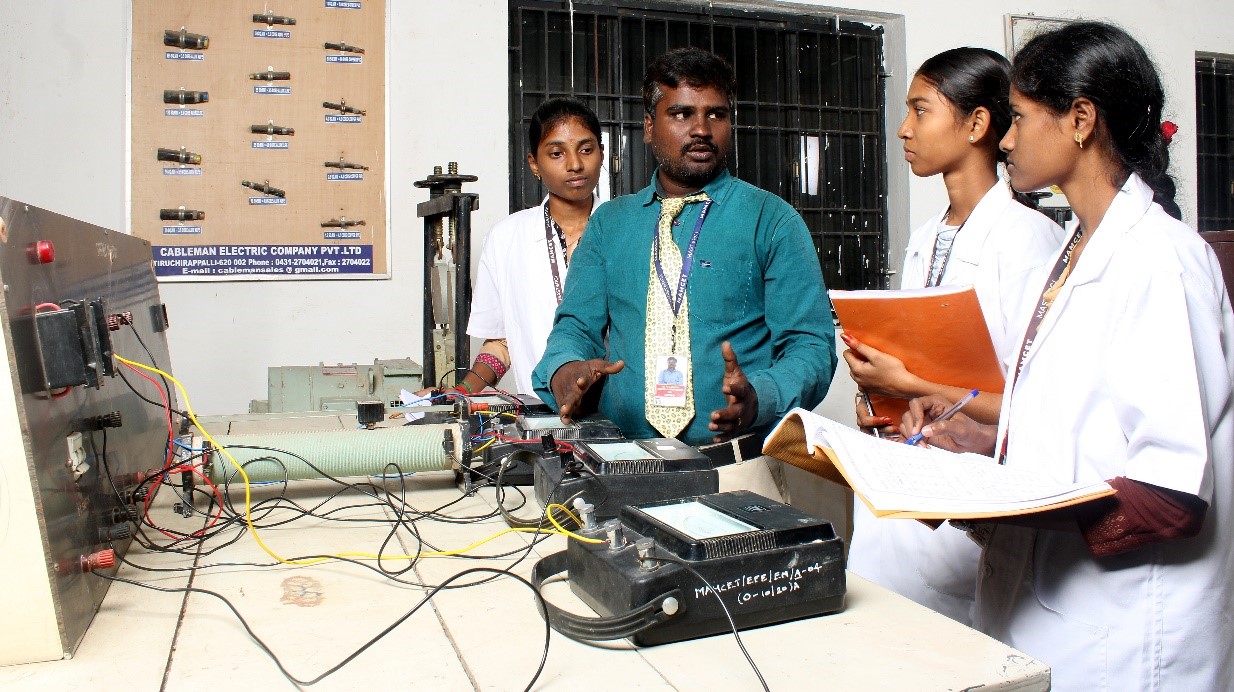
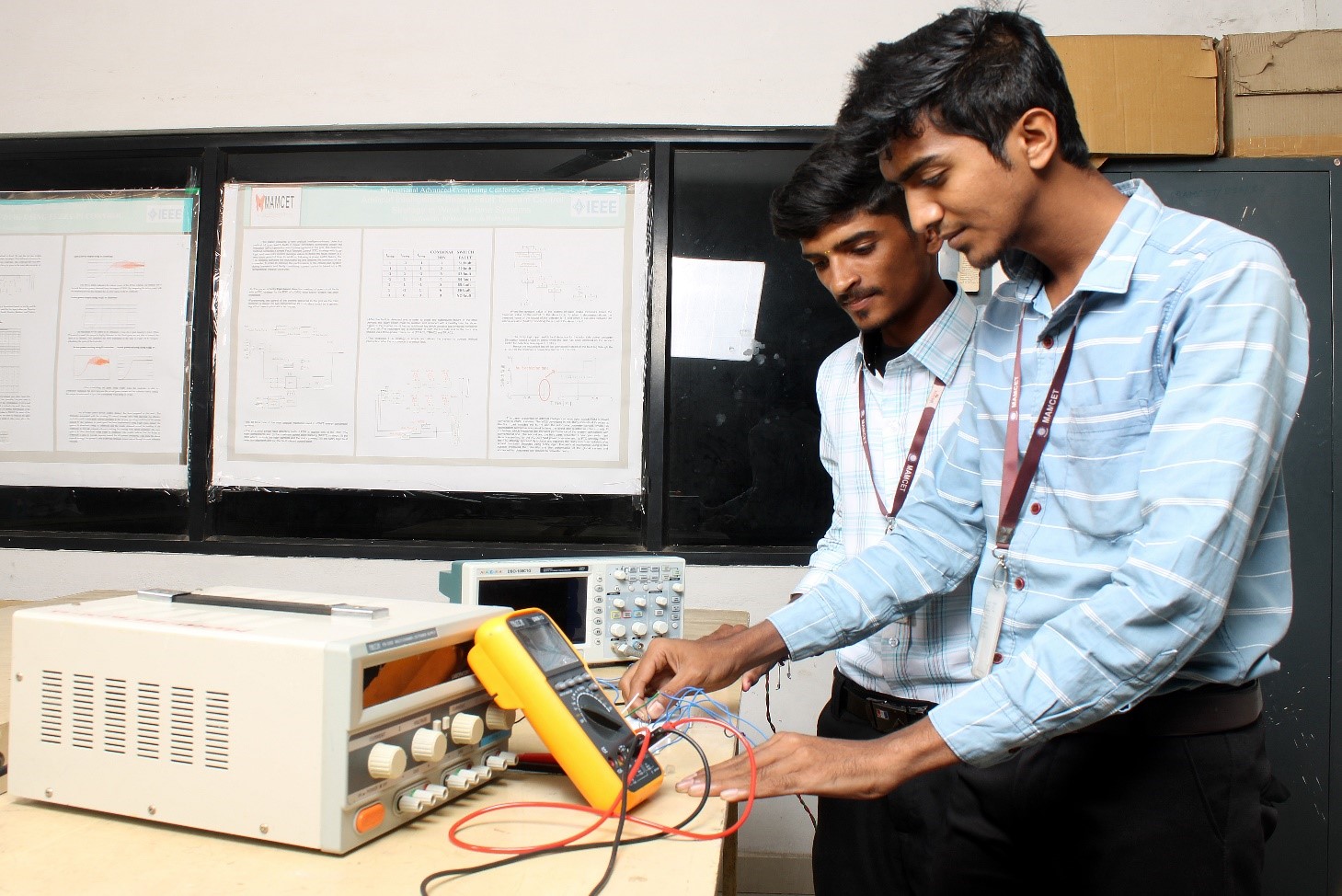
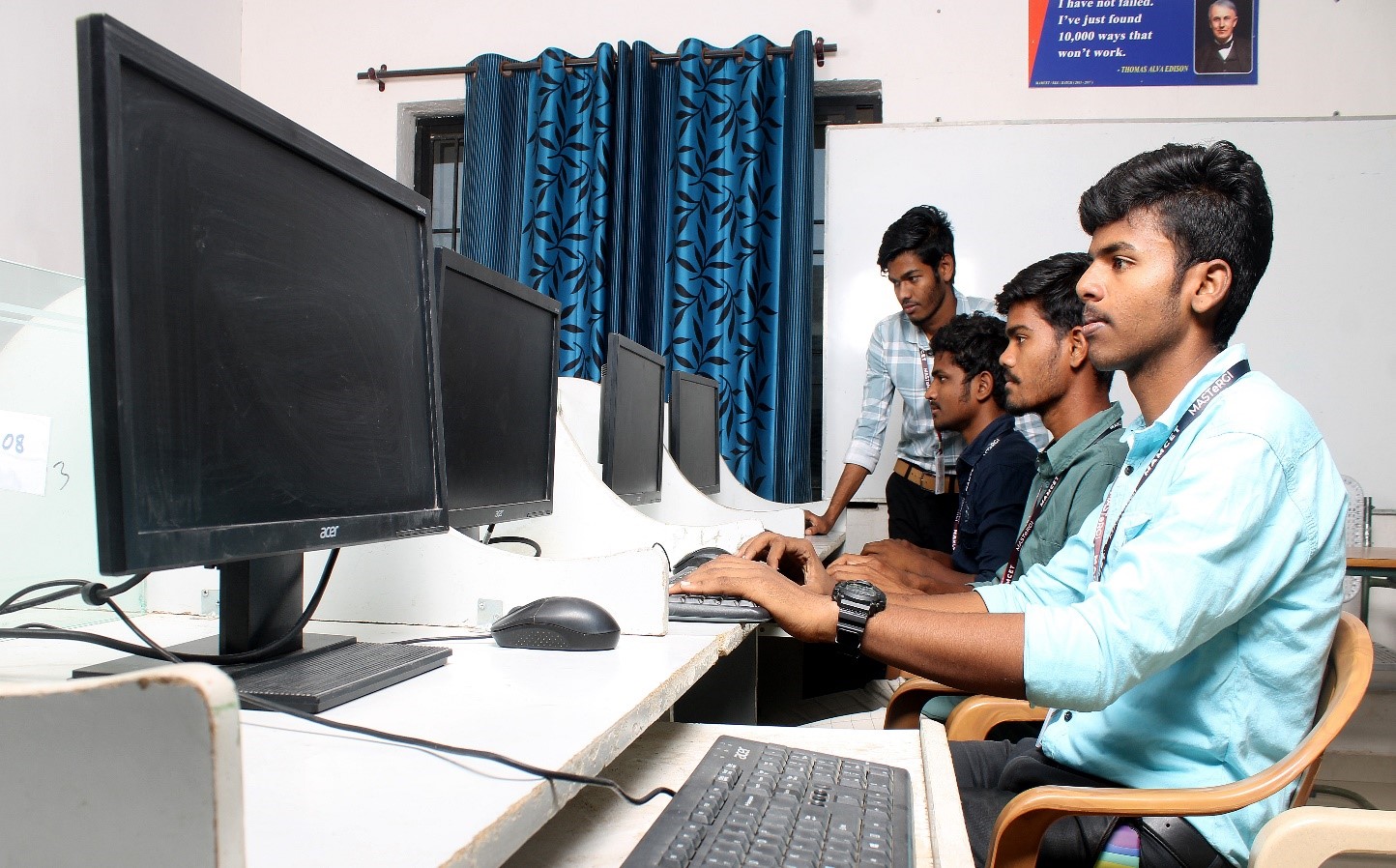
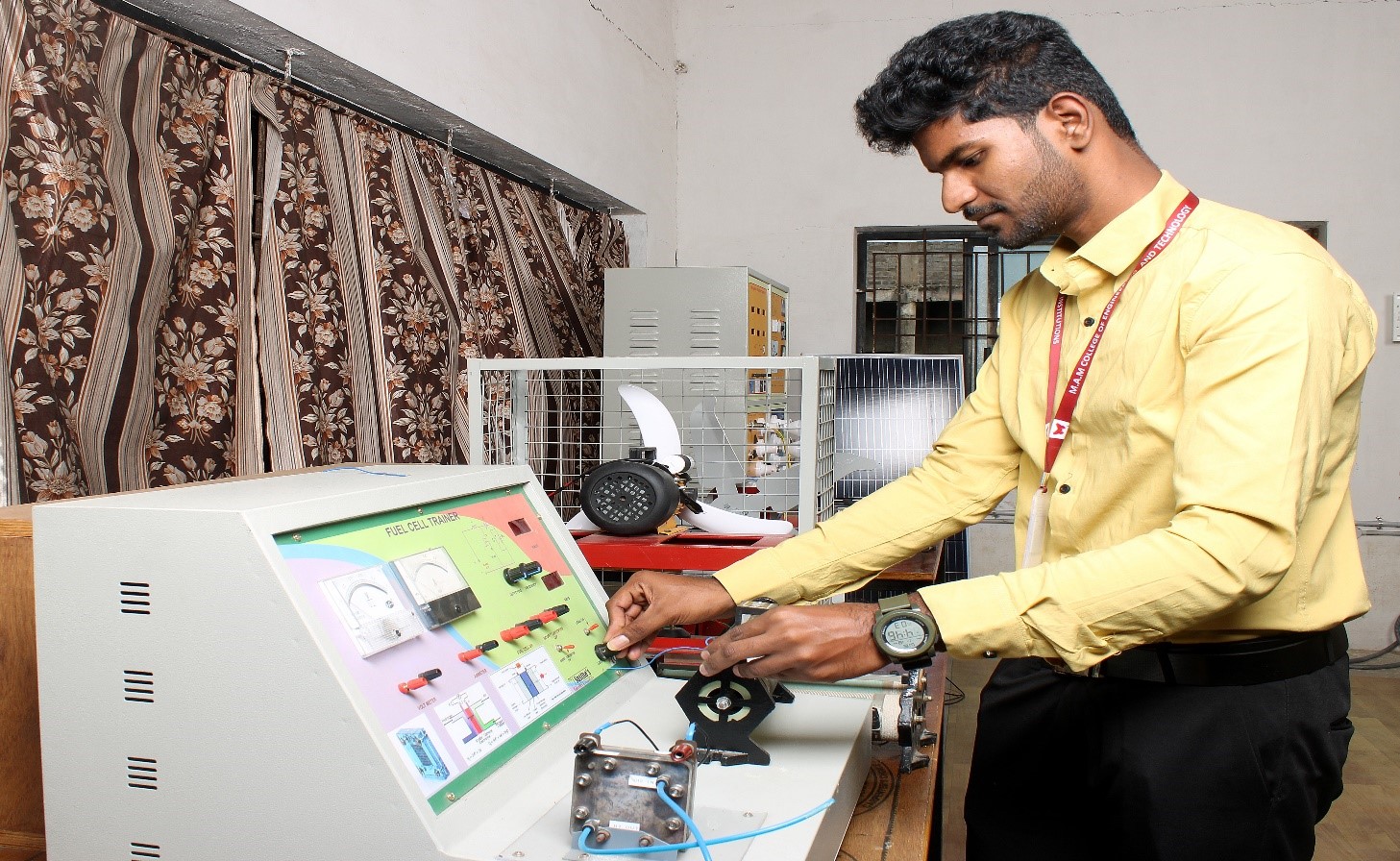





PLACEMENT DATA
| S.No | Name of the company | No. of Students Placed |
|---|---|---|
| 1 | SVASTI, Technology Solutions, Trichy | 2 |
| 2 | PIE, Infocomm,Lucknow | 1 |
| 3 | Sri Sai Power And Equipments | 4 |
| 4 | Aquasub Engineering, Coimbatore | 2 |
| 5 | Ultimate Power Source, Krishnagiri | 1 |
| 6 | SANMINA | 1 |
| 7 | Saehan Stamping Pvt. Ltd, Chennai | 1 |
| 8 | Tvs Sundaram Fasteners Ltd., Chennai | 4 |
| 9 | Omega Healthcare, Trichy | 2 |
| 10 | Pegatron Corporation, Chennai | 1 |
| 11 | Hanon Systems, Chennai | 1 |
| 12 | Caparo Forging Division India Pvt Ltd, Chennai | 3 |
| 13 | Daeseung Autoparts Pvt.Ltd | 1 |
| S.No | Name of the company | No. of Students Placed |
|---|---|---|
| 1 | Alass Infotech Solutions | 6 |
| 2 | Sri Sai Power And Equipments | 5 |
| 3 | Ilinks Infotech - Hi-Tech Solutions, Trichy | 5 |
| 4 | Delphi TVS | 4 |
| 5 | Vdart | 4 |
| 6 | Codingking | 3 |
| 7 | Levivaan Solutions Pvt Ltd | 3 |
Research
Research
The research and development is dedicated to nurturing a robust research culture by encouraging exploration in newly emerging and challenging areas within the EEE firms. Our dedicated faculty members and ardent students actively participate in projects that address real world challenges, making meaningful contributions to society. this enhances overall research capabilities of faculty and students through getting projects funds, publishing papers and participating in conferences seminars, workshops, project competitions etc.
In the Electrical and Electronics Engineering (EEE) department, our research and development efforts are passionately committed to fostering a vibrant research culture. We prioritize exploration in newly emerging and challenging areas within the EEE domain, driven by a vision of innovation and societal impact. Our dedicated faculty members and enthusiastic students dive into projects that tackle real-world challenges, making significant contributions to society. This dynamic environment not only propels technological advancements but also enhances the overall research capabilities of our faculty and students. Organize and participate in workshops, seminars, and training sessions to stay updated with the latest advancements and share knowledge. This comprehensive approach ensures that the department remains at the forefront of innovation, contributing significantly to both academic excellence and societal progress.
Objectives:
To conduct cutting-edge research and development in electrical and electronic engineering, aiming to innovate, solve industry challenges, and advance knowledge in areas such as renewable energy, power systems, electronics, and communication technologies.
Outcomes:
To generate innovative ideas and solutions to the academic and societal problems.
To enhance students’ and researchers’ skills through hands-on experience with advanced equipment and techniques.
To facilitate Interdisciplinary/Multidisciplinary research.
To promote research activity resulting in publications in reputable journal and conferences
To incur an external funding through grants and sponsorship to support further research initiatives
Student Project Involvement
To encourage the participation of research-oriented students in developing activities
To assist students in applying for funding from various agencies such as TNSCST, MSME, and IE(I) under the student project scheme, facilitating research and startup initiatives.
Project Proposal using R&D Lab:
To assign the senior faculty to various research organizations for getting collaborative projects and adopting best practices
To assist applying and getting funds for organizing seminars, workshops, and faculty development programs (FDPs) from various funding agencies.
To foster research activity within the academic community, for developing strategies and goals to promote growth in this area.
Research Activity
To develop new technologies, products, and solutions that address current challenges or improve existing systems in electrical and electronics engineering.
To promote publication of research findings in reputable journals and conferences, contributing to the dissemination of knowledge and advancing the field.
To create ambiance among the staff members to take up Research projects and improve their knowledge, skills and qualifications by registering Ph.D‘s
To create intellectual property such as patents, copyrights, and trademarks for novel inventions and innovations.
To assist in collaboration with industry partners to transfer research outcomes into practical applications, leading to commercialization opportunities and technology transfer.
To provide hands-on research experience for students, fostering skills in experimental design, data analysis, and critical thinking.
To contribute to the advancements in various sectors such as renewable energy, e-vehicle, healthcare technology, and automation.
To utilize funding from government agencies, industry sponsors, and foundations to support ongoing and future research initiatives.
| Sl. No | Principle Investigator | Title of the Projects | Name of the Funding Agency | Research Fund | Year of sanction | Status (Ongoing / Completed) |
|---|---|---|---|---|---|---|
| 1 | Dr.X.Susan Christina B.Muruganantham | Rural Livelihood transformation by converting the auto rickshaws to electric rickshaws with green powered charging stations using hybrid solar and wind energy | All India Council For Technical Education | 20,30,000 | 2022-23 | Progress |
| 2 | Mr.M.Vinoth Kumar | Modern Blind Stick | Tamilnadu state council for science and technology (TNSCST) | 7500 | 2022-23 | Completed |
| 3 | Mr.M.Vinoth Kumar | IoT Based Waste management Systems | UBA Rural Infrastructure Scheme-IIT-Delhi | 1,00,000 | 2021-22 | Completed |
| 4 | Mr.M.Vinoth Kumar | Perennial Fund-UBA-Solar Power RO Plant in Adopted Village in Konalai | UBA Rural Infrastructure Scheme-IIT-Delhi | 1,75,000 | 2020-21 | Completed |
| 5 | Dr.B.Muruganantham | To Enhance and Reinforcement of Moral Ethics to the Learned Faculty Members STTP | All India Council For Technical Education | 3,30,667 | 2020-21 | Completed |
| S.No | Project Title | Duration | Funding Agency | Year | Funding Amount |
|---|---|---|---|---|---|
| 1 | Comprehensive Power Quality Analysis and Energy conservation | 3 months | Kun Capital Automotive Pvt Ltd Ariyamangalam,Trichy. | 2022-2023 | 1,00,000 |
| 2 | Measurement of Electrical Parameters and Implementing Energy -saving measures | 3 months | Veda dairy Pvt ,Ltd,Musiri,Trichy | 2022-2023 | 1,00,000 |
| 3 | Converting relay contactor logic to PLC in Tow can unit operation. | 4 months | Shree Renga ,Polymers,unit- 1, Puliyur, Karur.unit- 2,kakkavadi, Karur | 2021-2022 | 1,60,000 |
| 4 | Electrical Equipment Power Quality analysis for equipment predictive maintenance and energy saving | 2 months | Velmurugan Industries, Trichy | 2020-2021 | 40,000 |
| S.No | Name of the Authors | Title of the Paper | Name of the Journal | Index | DOI Number |
|---|---|---|---|---|---|
| 1 | Mrs .A.MaryBeula, Mrs S.Rakkammal. | Solar Wireless Electric Vehicle Charging System | European Chemical Bulletin | Scopus | https://www.eurchembull.com/uploads/paper/467e082fc408d59f6dc4ed1632316027. |
| 2 | Dr.S.Rajasekaran | Assessment Of PQ Issues Using Dynamic Voltage Restorer With Adaptive Filter | Japan Society of Mechanical Engineers Journal of Biomechanical Science and Engineering | Scopus | DOI 101.17605/OSF.IO/Q3ZG ISSN:1880-9863 |
| 3 | Mrs.S.Rakkammal | IOT Based Dual Battery Monitoring and Charging System for Electric Vehicle Applications | International Journal of Advanced Trends in Engineering and Technology | UGC | https://doi.org/10.5281/zenodo.7823546 |
| 4 | Mr.N. Mayavel | IOT Based Solar Charging Station for E-Vehicle | International Journal of Scientific Research and Modern Education | UGC | https://doi.org/10.5281/zenodo.7906795 |
| 5 | Mr.R.Surendar | MD Integrated ILMS Control Using Programmable Logic Controller | International Journal of Computational Research and Development, | UGC | https://doi.org/10.5281/zenodo.7857189 |
| 6 | Mr .M.Vinoth Kumar | Iot Based Reverse Vending Machine For Recycling Station | International Journal of Current Research and Modern Education, | UGC | https://doi.org/10.5281/zenodo.7934114 |
| 7 | Mrs .A. Mary Beula | Wireless Power Charging And Hybrid Power Generation For Electric Vehicle | International Journal of Engineering Research and Modern Education (IJERME) | UGC | https://doi.org/10.5281/zenodo.7833857 |
| 8 | Mrs .L.Glarida Amala | A Solar Tree Based Energy Harvesting, Tracking And Fault Detection System | Indo American Journal of Multidisciplinary Research and Review | UGC | http://iajmrr.com/article-issues/?cid=39 |
| 9 | Ms .A. Abirami, | Solar Based E-Uniform for Soldiers | International Journal of Advanced Trends in Engineering and Technology, | UGC | https://doi.org/10.5281/zenodo.7896772 |
| S.No | Name of the Authors | Title of the Paper | Name of the Journal | Index | DOI Number |
|---|---|---|---|---|---|
| 1 | Mr.M.Vinothkumar, Mr.N .Mayavel, Mr.R.Surendar | Soft switched DC-DC converter for hybrid power generation photovoltaic panels using fuzzy logic controller | Materials Today: Proceedings – Elesvier- | Scopus | https://doi.org/10.1016/j.matpr.2022.05.146 |
| 2 | Dr.Rajasekaran S DrMuruganandam B Mrs.Rakkammal S Mrs.Mary Beula Mr.N. Mayavel Mr. R.Surendar | Automatic Ration Material Distribution System | Mathematical Statistician and Engineering Applications. | Scopus | Page Number: 13084-13092 Publication Issue:Vol.71 No.4(2022) |
Events
-
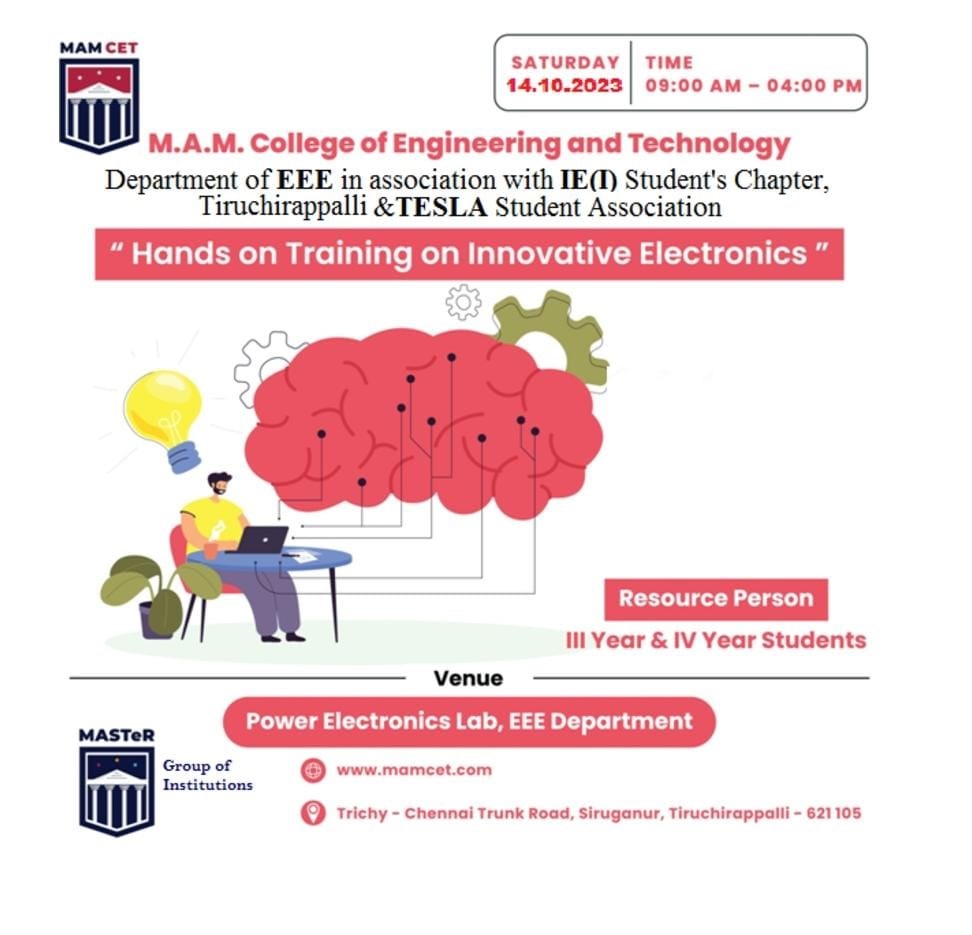
Hands on Training on Innovative Electronics
14/10/2023Date: 14-10-2023
Resource person: III & IV Year
Beneficiary: II Year14/10/2023Hands on Training on Innovative Electronics
Date: 14-10-2023 Resource person: III & IV Year Beneficiary: II Year
-
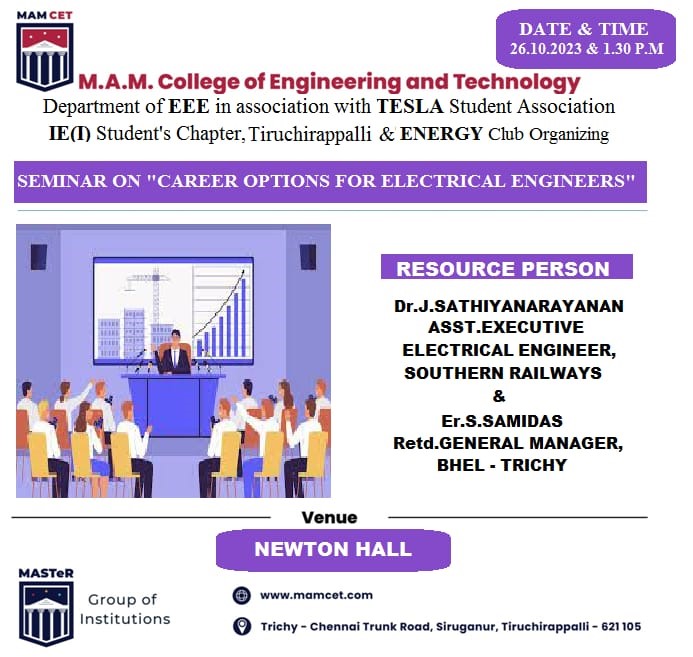
Seminar on Career options for Electrical Engineers
26/10/2023Resource person: Dr.J.Sathiyanarayanan, Asst.Executive Electrical Engineer, Southern Railways & Er.S.Samidas Retd. General Manager, BHEL-Trichy Beneficiary: II,III&IV Year
26/10/2023Seminar on Career options for Electrical Engineers
Resource person: Dr.J.Sathiyanarayanan, Asst.Executive Electrical Engineer, Southern Railways & Er.S.Samidas Retd. General Manager, BHEL-Trichy Beneficiary: II,III&IV Year
-
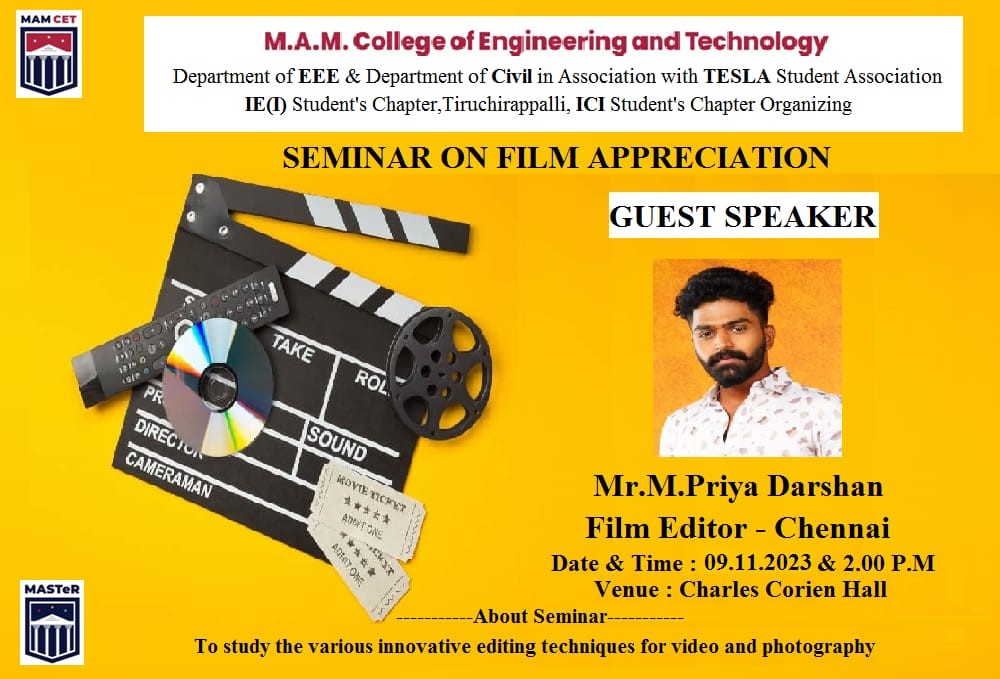
Seminar on Film Appreciation
09/11/2023Date: 09-11-2023
Resource person: Mr.M.Priya Darshan Film Editor – Chennai
Beneficiary: II,III&IV Year09/11/2023Seminar on Film Appreciation
Date: 09-11-2023 Resource person: Mr.M.Priya Darshan Film Editor – Chennai Beneficiary: II,III&IV Year
-
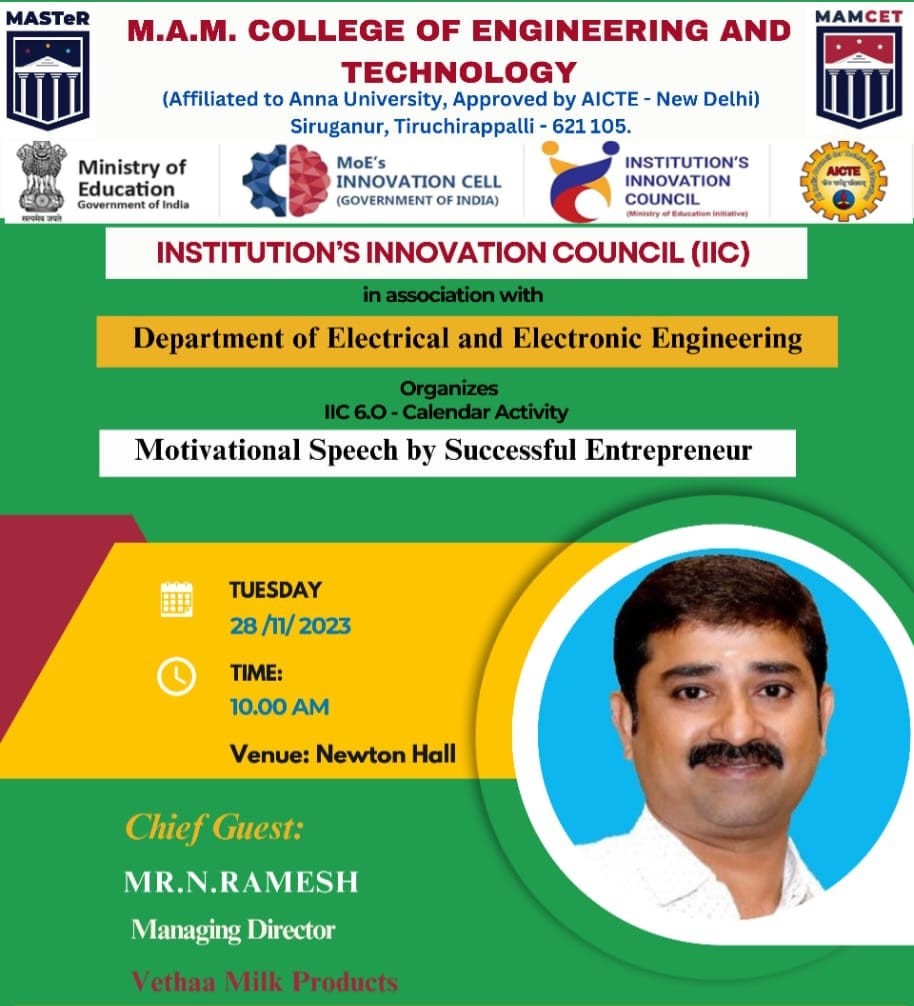
Motivational Speech by Successful Entrepreneur
28/11/2023Date: 28-11-2023
Resource person: Mr.N.Ramesh, Managing director, Vethaa Milk Products.
Beneficiary: II,III&IV Year28/11/2023Motivational Speech by Successful Entrepreneur
Date: 28-11-2023 Resource person: Mr.N.Ramesh, Managing director, Vethaa Milk Products. Beneficiary: II,III&IV Year
-

IoT Concepts and its Applications
29/02/2024Resource Person: Mr. M. Madhan Kumar Power Integrated Solutions, Trichy.
Beneficiary: III & IV YEARSeminar 29/02/2024IoT Concepts and its Applications
Resource Person: Mr. M. Madhan Kumar Power Integrated Solutions, Trichy. Beneficiary: III & IV YEAR
-

Advances in control of Power Systems
19/03/2024Date: 19-03-2024
Resource Person: Dr.S.Dharmalingam, General Manager, BHEL, Trichy
Beneficiary: II,III & IV YEARSeminar 19/03/2024Advances in control of Power Systems
Date: 19-03-2024 Resource Person: Dr.S.Dharmalingam, General Manager, BHEL, Trichy Beneficiary: II,III & IV YEAR
-

Recent trend in Smart Grid Technologies
20/03/2024Date: 20-03-2024
Resource Person: Dr.R.Gnanadass Professor Dept of EEE ,Puducherry Technological University, Puducherry.
Beneficiary: III & IV YEARSeminar 20/03/2024Recent trend in Smart Grid Technologies
Date: 20-03-2024 Resource Person: Dr.R.Gnanadass Professor Dept of EEE ,Puducherry Technological University, Puducherry. Beneficiary: III & IV YEAR
-

National level Technical Symposium “ELECTROBLITZ -2K24”
06/04/2024Date: 06-04-2024
Resource Person: Shri.M.Ramanan,Infra Dev Specialist CTS, Chennai.
Beneficiary: II,III & IV YEARSymposium 06/04/2024National level Technical Symposium “ELECTROBLITZ -2K24”
Date: 06-04-2024 Resource Person: Shri.M.Ramanan,Infra Dev Specialist CTS, Chennai. Beneficiary: II,III & IV YEAR
-
IIT PALS Study Circle for GATE / JAM – Launch Event
12/08/2022Resource person: Dr.V.Kamakotti, Director, IITM, Chennai
Beneficiary: II,III&IV YearWebinar 12/08/2022IIT PALS Study Circle for GATE / JAM – Launch Event
Resource person: Dr.V.Kamakotti, Director, IITM, Chennai Beneficiary: II,III&IV Year
-
Design and modeling of E-Vehicle
18/08/2022Resource person: Er.A. Abdhaheer, Sr. Testing and Commissioning Engineer SPK Power infra–Pvt Ltd.
Beneficiary: II,III&IV YearSeminar 18/08/2022Design and modeling of E-Vehicle
Resource person: Er.A. Abdhaheer, Sr. Testing and Commissioning Engineer SPK Power infra–Pvt Ltd. Beneficiary: II,III&IV Year
-
Enterprise Digital Twin as a risk free experimentation aid for business and social systems
25/08/2022Resource person: Dr Souvik Barat , Principal Scientist, Tata Consultancy Services Research, India
Beneficiary: II,III&IV YearWebinar 25/08/2022Enterprise Digital Twin as a risk free experimentation aid for business and social systems
Resource person: Dr Souvik Barat , Principal Scientist, Tata Consultancy Services Research, India Beneficiary: II,III&IV Year
-
Environmental friendly High Voltage insulation system
26/08/2022Resource person: Er.G.Sivabalan, Sr. Project Engineer, Gensol Solar Engineering Pvt Ltd.
Beneficiary: II,III&IV YearSeminar 26/08/2022Environmental friendly High Voltage insulation system
Resource person: Er.G.Sivabalan, Sr. Project Engineer, Gensol Solar Engineering Pvt Ltd. Beneficiary: II,III&IV Year
-
Importance of Electrical Storage system with reliable decorbanized system
01/09/2022Resource person: Dr.S.Dharmalingam, Manager , BHEL Trichy
Beneficiary: II,III&IV YearWebinar 01/09/2022Importance of Electrical Storage system with reliable decorbanized system
Resource person: Dr.S.Dharmalingam, Manager , BHEL Trichy Beneficiary: II,III&IV Year
-
Hands on Training on Innovative Electronics
17/09/2022Resource person: 3rd and 4th year Students
Beneficiary: II,III&IV Year17/09/2022Hands on Training on Innovative Electronics
Resource person: 3rd and 4th year Students Beneficiary: II,III&IV Year
-
3D Printing and its applications
22/09/2022Resource person: Ms. Padarthi Padmaja, Chief Executive Officer, Next generation 3d printer private limited, Chennai Beneficiary: II,III&IV Year
Webinar 22/09/20223D Printing and its applications
Resource person: Ms. Padarthi Padmaja, Chief Executive Officer, Next generation 3d printer private limited, Chennai Beneficiary: II,III&IV Year
-
AI Driven trends in Healthcare
27/10/2022Resource person: Mr. KrishnaKanth Naik, Senior Escalation Engineer, IBM India Pvt. Limited
Beneficiary: II,III&IV YearWebinar 27/10/2022AI Driven trends in Healthcare
Resource person: Mr. KrishnaKanth Naik, Senior Escalation Engineer, IBM India Pvt. Limited Beneficiary: II,III&IV Year
-
Application of Embedded system in Electric Vehicles
28/10/2022Resource person: S.Deepan, Embedded Developer & Manager, WITSPIRE, Tiruchirappalli.
Beneficiary: II,III&IV YearWorkshop 28/10/2022Application of Embedded system in Electric Vehicles
Resource person: S.Deepan, Embedded Developer & Manager, WITSPIRE, Tiruchirappalli. Beneficiary: II,III&IV Year
-
Pathway from Engineering to Product Development and Entrepreneurship
03/11/2022Resource person: Dr. Ashish Kumar Sahani, Assistant Professor, Department of Biomedical Engineering, IIT Ropar, Founder of Epilepto Systems
Beneficiary: II,III&IV YearWorkshop 03/11/2022Pathway from Engineering to Product Development and Entrepreneurship
Resource person: Dr. Ashish Kumar Sahani, Assistant Professor, Department of Biomedical Engineering, IIT Ropar, Founder of Epilepto Systems Beneficiary: II,III&IV Year
-
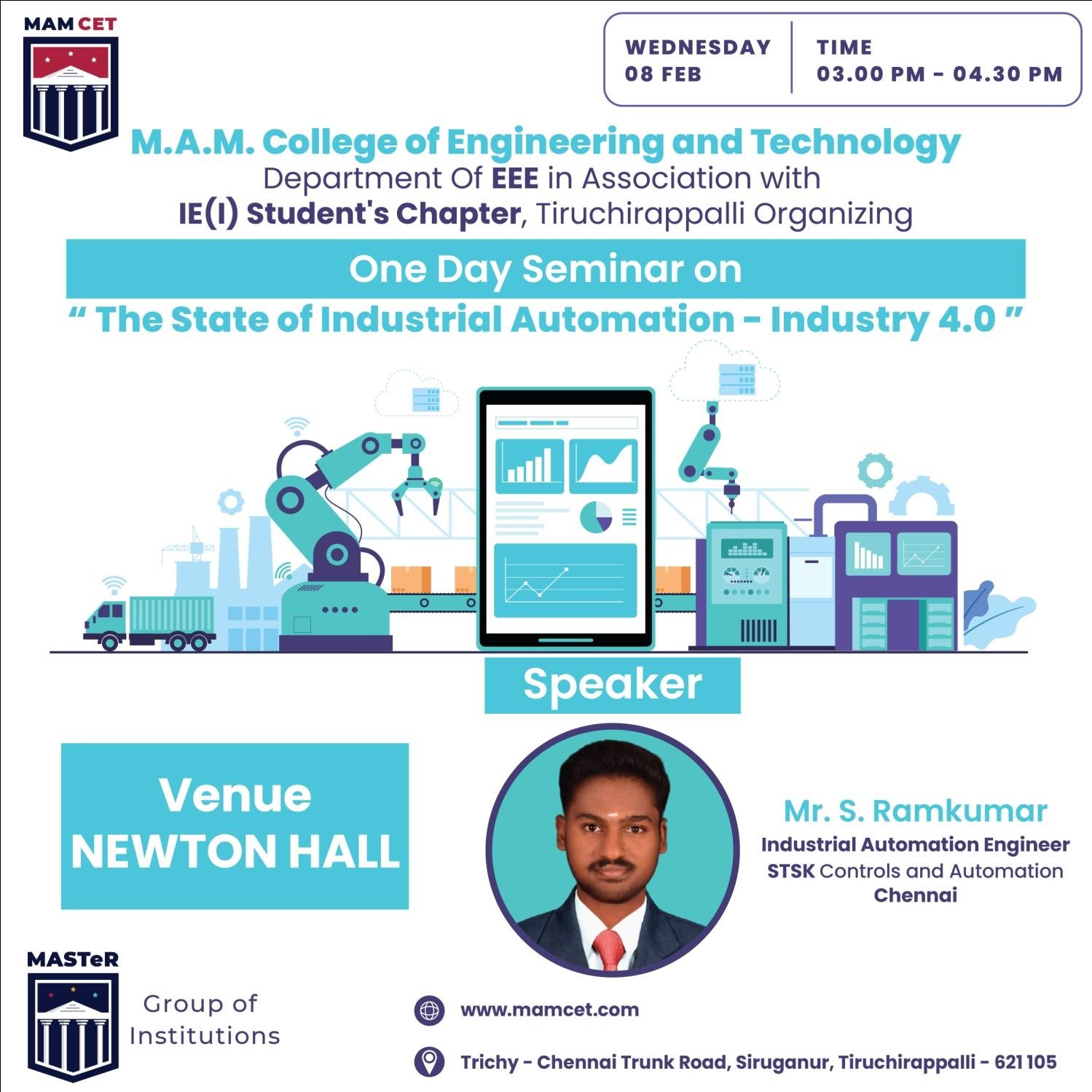
State of Industrial Automation-Industry 4.0
08/02/2023Resource person: S.Ramkumar, Industrial Automation Engineer/PLC&SCADA Developer
Beneficiary: II,III&IV Year
After Vision, Mission, PEO’s and PSO of EEE department was discussed, and it was followed by resource person Er.S.Ramkumar. He started the webinar by gave an introduction about Industrial Automation. He elaborately explained various types of automation used in various industries. He provides information of implementing automation in industry and offers information about components of automation and its inputs.Webinar 08/02/2023State of Industrial Automation-Industry 4.0
Resource person: S.Ramkumar, Industrial Automation Engineer/PLC&SCADA Developer Beneficiary: II,III&IV Year After Vision, Mission, PEO’s and PSO of EEE department was discussed, and it was followed by resource person Er.S.Ramkumar. He started the webinar by gave an introduction about Industrial Automation. He elaborately explained various types of automation used in various industries. He provides information of […]
-
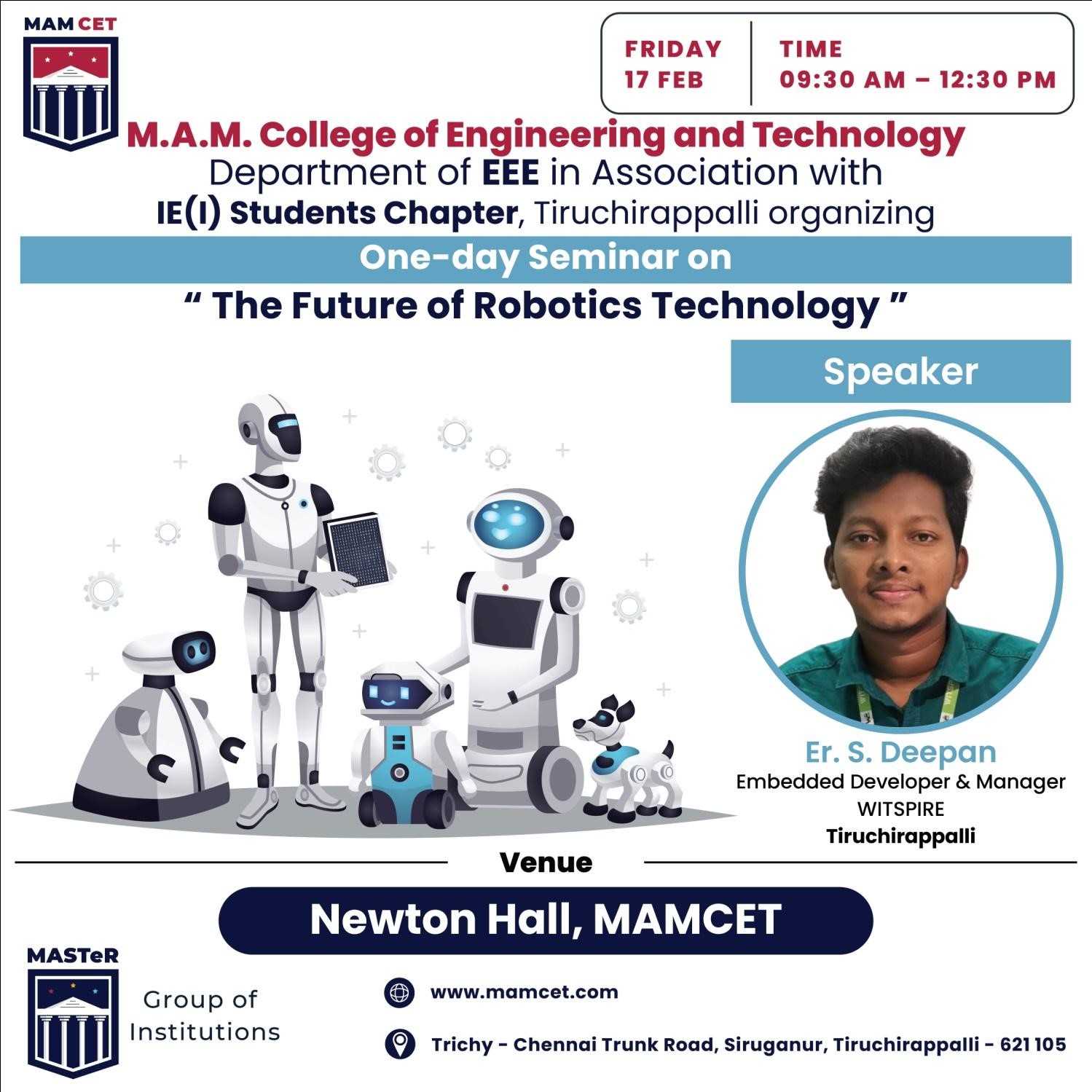
The future of Robotics Technology
17/02/2023Resource person: S.Deepan, Embedded Developer & Manager, WITSPIRE, Tiruchirappalli.
Beneficiary: II,III&IV YearAfter Vision, Mission, PEO’s and PSO’s of EEE department was discussed, and it was followed by resource person Er.S.Deepan .he started the webinar by gave an introduction about Robots and its evaluation. He elaborately explained various laws of robotics. He explains importance of robots in automation industries and offers information about various robots in recent field.
Seminar 17/02/2023The future of Robotics Technology
Resource person: S.Deepan, Embedded Developer & Manager, WITSPIRE, Tiruchirappalli. Beneficiary: II,III&IV Year After Vision, Mission, PEO’s and PSO’s of EEE department was discussed, and it was followed by resource person Er.S.Deepan .he started the webinar by gave an introduction about Robots and its evaluation. He elaborately explained various laws of robotics. He explains importance of […]
-
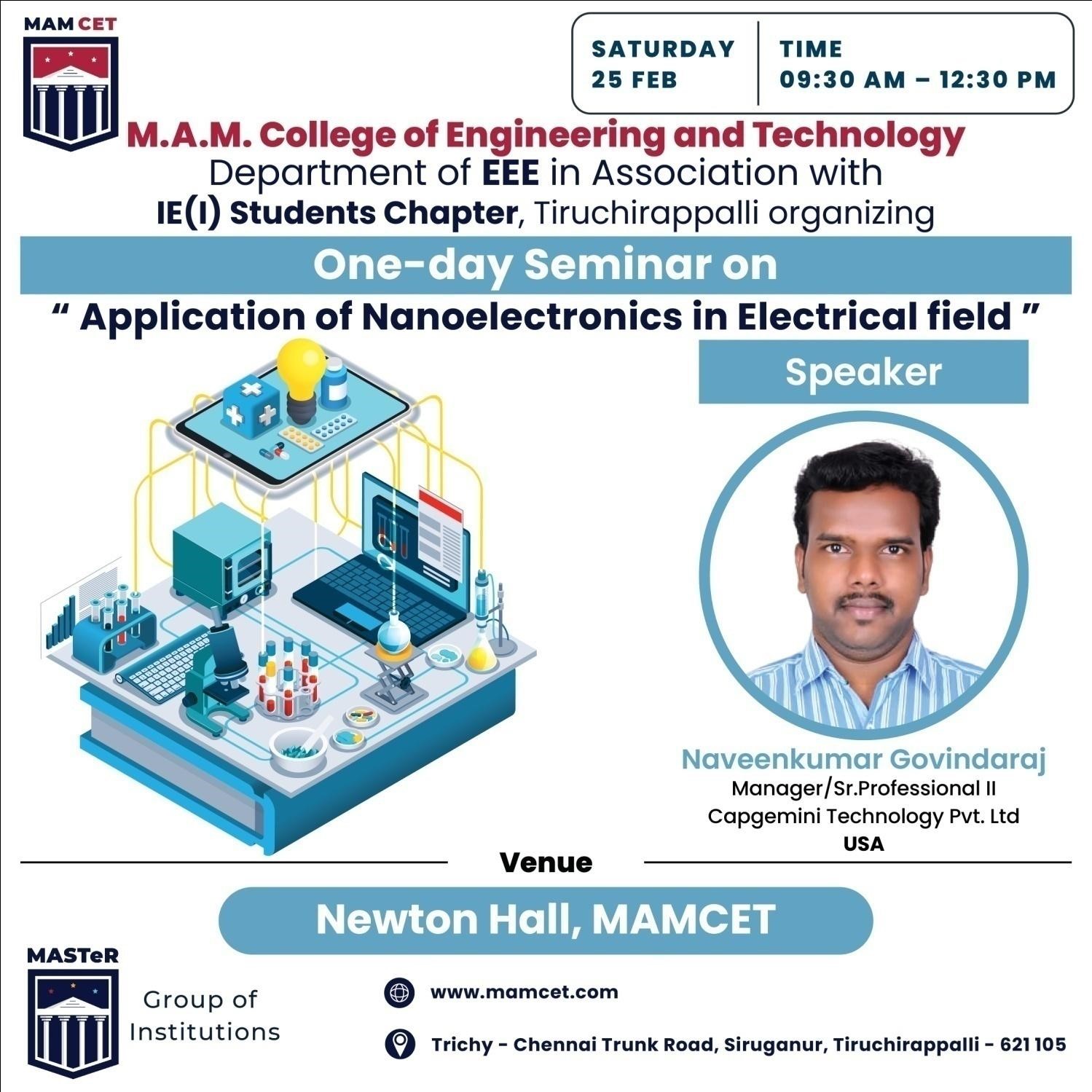
Application of Nano electronics in Electrical field
25/02/2023Resource person: Mr.NaveenKumar Govindaraj, Senior Testing Engineer, CTS, Bangalore
Beneficiary: II,III&IV Year
After Vision, Mission, PEO’s and PSO’s of EEE department was discussed and it was followed by resource person Er. G.NaveenKumar. He started the Seminar by giving an introduction about advancement in infotainment system. He detailed about services of infotainment system and its types. Then he elaborately discussed about manual and auto tuning systems. Further he moved to entertainment services in automatic cars. Then he explained about phone service provided in infotainment system. He also explained about rear parking assistance and navigation system. He gave detailed explanation about ADAS. Then he moved to antilock breaking system and adaptive cruise control. He also explained the concept of driver drowsiness detection system and emergency breaking system (EBS). Then he thoroughly explained about Intelligent speed assistance and pedestrian detection in automatic vehicle. Then he explained about the technology of autonomous car. After all he detailed about Google self driving car. Finally the seminar was end up with vote of thanks by the final year student/executive member M.Dinesh.Seminar 25/02/2023Application of Nano electronics in Electrical field
Resource person: Mr.NaveenKumar Govindaraj, Senior Testing Engineer, CTS, Bangalore Beneficiary: II,III&IV Year After Vision, Mission, PEO’s and PSO’s of EEE department was discussed and it was followed by resource person Er. G.NaveenKumar. He started the Seminar by giving an introduction about advancement in infotainment system. He detailed about services of infotainment system and its types. […]
-
Importance of Power Controllers in Space Applications.
17/03/2023Resource person: Shri.G.Balasubramanian, Deputy project Director, ISRO, Shriharokota
Beneficiary: II,III&IV YearSeminar 17/03/2023Importance of Power Controllers in Space Applications.
Resource person: Shri.G.Balasubramanian, Deputy project Director, ISRO, Shriharokota Beneficiary: II,III&IV Year
-
Recent Trends in EV and its Challenges
17/03/2023Resource person: Shri.G.Balasubramanian, Deputy project Director, ISRO, Shriharokota
Beneficiary: II,III&IV Year
The chief guest, Shri.G.Balasubramanian, Deputy Project Director, ISRO, Sriharikota shared wonderful words of encouragement with the students quoting the need to invest in improving the practical know-how of every engineering student apart from the theoretical knowledge they gain in the course of their study. He explained in detail about motor drive in aerospace technology. Further he detailed about satellite power system and electric propulsion system. Then he explained about on-board electric propulsions. Also he interacts with the students then he clarifies and answers the participants questions.Guest Lecture 17/03/2023Recent Trends in EV and its Challenges
Resource person: Shri.G.Balasubramanian, Deputy project Director, ISRO, Shriharokota Beneficiary: II,III&IV Year The chief guest, Shri.G.Balasubramanian, Deputy Project Director, ISRO, Sriharikota shared wonderful words of encouragement with the students quoting the need to invest in improving the practical know-how of every engineering student apart from the theoretical knowledge they gain in the course of their study. […]
-
Energy Conservation and Safety in Industries
01/04/2023Resource person: Shri.Magdaline Mary, Assistant Engineer, TNEB.
Beneficiary: II,III&IV YearSeminar 01/04/2023Energy Conservation and Safety in Industries
Resource person: Shri.Magdaline Mary, Assistant Engineer, TNEB. Beneficiary: II,III&IV Year
-
High voltage substation equipment, motor and generator: safety, operation and maintenance
21/04/2023Resource person: Er.Udaiyappan, AD/TNEB, Trichy.
Beneficiary: II,III&IV YearSeminar 21/04/2023High voltage substation equipment, motor and generator: safety, operation and maintenance
Resource person: Er.Udaiyappan, AD/TNEB, Trichy. Beneficiary: II,III&IV Year
-
Awareness on Entrepreneurship / Start Up
04/06/2021Shri Sahaya Josephraj,
Deputy General Manager (HR) Department
Oil and Natural Gas Corporation Limited (ONGC),KaraikalWebinar 04/06/2021Awareness on Entrepreneurship / Start Up
Shri Sahaya Josephraj, Deputy General Manager (HR) Department Oil and Natural Gas Corporation Limited (ONGC),Karaikal
-
Income through online
07/07/2021Mr.Mohamed Niyas, Alumni-2017, Department of EEE,MAMCET
CEO Tancube Marketing, KeralaWebinar 07/07/2021Income through online
Mr.Mohamed Niyas, Alumni-2017, Department of EEE,MAMCET CEO Tancube Marketing, Kerala
-
Electrical Engineering for the future Horizon
21/08/2021Dr.B.Muruganantham,
Registrar-MASTeR Group of InstitutionsWebinar 21/08/2021Electrical Engineering for the future Horizon
Dr.B.Muruganantham, Registrar-MASTeR Group of Institutions
-
Wireless LAN & Automotive Infotainment System
28/08/2021Mr.Naveen Kumar Govindaraj,
Tech Lead,
Capgemini Engineering,
Bangalore, IndiaWebinar 28/08/2021Wireless LAN & Automotive Infotainment System
Mr.Naveen Kumar Govindaraj, Tech Lead, Capgemini Engineering, Bangalore, India
-
Erection and commissioning of Solar Panel
04/09/2021Er.G.Sivabalan,
Sr. Project Engineer, Gensol Solar Engineering Pvt Ltd.04/09/2021Erection and commissioning of Solar Panel
Er.G.Sivabalan, Sr. Project Engineer, Gensol Solar Engineering Pvt Ltd.
-
Testing and Commissioning of substation equipments
24/09/2021Er.A. Abdhaheer,
Sr. Testing and Commissioning Engineer
SPK Power infra–Pvt Ltd.Hands on training 24/09/2021Testing and Commissioning of substation equipments
Er.A. Abdhaheer, Sr. Testing and Commissioning Engineer SPK Power infra–Pvt Ltd.
-
Industrial Networking for Control and Automation
22/10/2021Dr. A. Lakshmi Sangeetha.
Assistant professor.
Velammal Engineering College, Chennai.Webinar 22/10/2021Industrial Networking for Control and Automation
Dr. A. Lakshmi Sangeetha. Assistant professor. Velammal Engineering College, Chennai.
-
Overview of Industrial Automation
29/10/2021S.Ramkumar,
Industrial Automation Engineer/PLC&SCADA DeveloperWebinar 29/10/2021Overview of Industrial Automation
S.Ramkumar, Industrial Automation Engineer/PLC&SCADA Developer
-
Electric transportation in infrastructure for e-mobility’
12/11/2021Mr.M.Vinothkumar
Assistant Professor/EEE
MAMCETWebinar 12/11/2021Electric transportation in infrastructure for e-mobility’
Mr.M.Vinothkumar Assistant Professor/EEE MAMCET
-
Recent Trends in Smart Grid Technology
29/04/2022Dr.R.Gnanadass
Professor/Department of EEE, Puducherry Technological University
PondicherryWebinar 29/04/2022Recent Trends in Smart Grid Technology
Dr.R.Gnanadass Professor/Department of EEE, Puducherry Technological University Pondicherry
-
The Institution of Engineers (India) – Student Chapter
04/05/2022Mrs. Merlin Mary N J
Ph. D. Scholar
(Prime Minister’s Research Fellows)
National Institute of Technology, Trichy.Webinar 04/05/2022The Institution of Engineers (India) – Student Chapter
Mrs. Merlin Mary N J Ph. D. Scholar (Prime Minister’s Research Fellows) National Institute of Technology, Trichy.
Memorandum of Understanding (MOU)
The industry supported laboratories develop the best learning process using a comprehensive understanding of industry’s best practices for both students and faculty. To strengthen interaction with industries and to keep our students updated with the latest trends in Electrical Engineering.
Industry supported Laboratories
Sl.No |
Name of the company |
Name of the laboratory |
Year |
|---|---|---|---|
|
1 |
Flowtrik EV charging solutions |
EV Laboratory - II |
2023 |
|
2 |
EV Nexus Pvt.Ltd. |
EV Laboratory - I |
2023 |
MoU of Core industries
Sl.No |
Name of the company |
Year of MOU Sign |
|---|---|---|
|
1 |
Flowtrik EV charging solutions |
2023 |
|
2 |
EV Nexus Pvt.Ltd. |
2023 |
|
3 |
Propeller Technologies |
2022 |
|
4 |
Jet Aero Space |
2022 |
|
5 |
Hilife.AI |
2022 |
|
6 |
Eurocasting Engineering |
2021 |
Industry Interaction
In-Plant Training
S.NO | Name of the Event | Date | Resource Person/ company details | Targeted Audience |
1 | Guest Lecture on Recent trends in EV and its challenges | 3.03.2023 | Dr. K. Padmanabhan,Director ,EV NEXUS Pvt. Ltd. | Second year, Third year and Final year |
2 | Seminar on Design and modeling of E-Vehicle. | 18.08.2022 | Er. A. Abdhaheer, Sr. Testing and Commissioning Engineer, SPK Power infra–Pvt Ltd. | Second year, Third year and Final year |
| S.NO | Name of the Event | Date | Resource Person/ company details | Targeted Audience |
| 1 | Guest lecture on Fundamentals in Ethics of Technology. | 16.04.2021 | Mr. Naveen Kumar Govindaraj,Senior Testsing Engineer,CTS, Bangalore | Second year, Third year and Final year |
| 2 | Guest lecture on Industrial Automation Using PLC | 04.02.2021 | Mr.Rasadurai Murugesan,Lead Engineer from GM Tech center India ,Bangalore. | Second year, Third year and Final year |
| 3 | Webinar on Introduction to LABVIEW | 21.06.2020 | Ms.J.Ajantha Patent scientist,Dextrasys Private Limited. |
Second year, Third year and Final year |
Industrial Visit
S.No | Academic Year | Industry Name with Address | Area of visit | No. of students participated | Type of Industry (Core/Non-core) |
1 | 2021-2022 | Munnar Tea Factory, Munnar | Electrical Drives and Control | 79 | Core |
2 | 2022-2023 | Sandal Wood Oil Division, Mysore, Karnataka | Industry Automation | 55 | Core |
3 | 2022-2023 | TATA Solar Power Plant, Musiri(Tk), Trichy | Solar Power Plant Operation and maintenance | 79 | Core |
Internship Details
S.No | Name of the Company | Internship Details | No. of students participated |
1 | Vagus technology, Trichy. | Digital Marketing | 6 |
2 | Witspire, Trichy | Basic Embedded System | 10 |
3 | Dynamic hands and control ltd. Chennai. | Electrical Division | 1 |
4 | Power Integrated salutation, Trichy | Electrical Division | 4 |
5 | AJ Tech research lab, Coimbatore | Marketing | 1 |
6 | Code Bind Embedded system, Trichy. | sic Embedded System and IoT | 1 |
S.No | Name of the Company | Internship Details | No. of students participated |
1 | CRI Pumps,Coimbatore | Electrical Division | 4 |
2 | ABC Programming,Chennai | Digital Marketing | 1 |
3 | Muskurahat Foundation,Mumbai,Maharastra. | Crowd Funding | 1 |
4 | Maxelerator Foundation,Madurai. | Basic Embedded sytem and IOT | 1 |
5 | Hamari Pahchan NGO | Social Entrrpreneurship | 1 |
S.No | Name of the Company | Internship Details | No. of students participated |
1 | PT series,Chennai. | Marketing | 1 |
2 | Lead And Seal,Chennai. | Core | 1 |
3 | Global Marketing Media,Pune. | Marketing | 1 |
4 | Amazon private limited,Trichy | Marketing | 1 |
NEWS LETTER
MAGAZINE
MAGAZINE 2020 - 2021
MAGAZINE 2021-2022
MAGAZINE 2022- 2023
Value Added Courses
Title: Value added course on “IoT Concepts and its Applications"
Resource Person : Mr. M. Madhan Kumar, Power Integrated Solutions, Trichy
Date: 01-03-2024 to 06-03-2024
Title: Value added course on sensors and embedded system evaluation using Arduino
Resource Person : Mr.M.Madhan Kumar, Power Integrated solutions, Trichy
Date: 21-04-2023 to 29-04-2023
Title: Value added course on Design of solar PV for Domestic Load
Resource Person: S.Ramkumar, Industrial Automation Engineer/PLC&SCADA Developer
Date: 12.07.2021 to 23.07.2021
Title: Value added course on Electric and Hybrid Vehicles
Resource Person: Dr.Kevin Ark Kumar, Manager BHEL, Trichy & Dr.Selvaraj Professor, REC, Chennai
Date: 14.12.2020 to 24.12.2020
Title: Value added course on IoT for Real Time Applications
Resource Person: Mr.M.Vinothkumar, Mr.A.Rathinavel, Mr.R.Surendar Assistant Professor/EEE
MAMCET
Date: 20.10.2020 to 05.12.2020
Title: Value added course Energy Management and Energy Auditing
Resource Person: Mrs.A.Marybeula, Mr.R.Vadevelan, Mr.N.Mayavel, Assistant Professor/EEE MAMCET
Date: 20.10.2020 to 05.12.2020
Get in touch
Dr.RAJASEKARAN.S
Professor & Head/EEE, MAMCET, Trichy.
MAIL ID: hod.eee@mamcet.com
Mobile no : 9994013168







